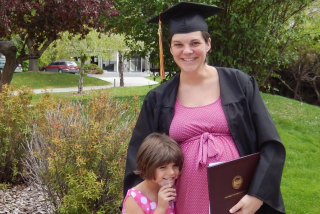Letters : Gaudiness Recalled
Robert Pierson’s otherwise interesting and informative article, “A Stroll Through Hollywood’s Gaudy Early Era,” (Oct. 25) contains several errors or misstatements:
. . . A statement is made that “A Girl From Yesterday” was made in 1914. The film was both produced and released in 1915, and the correct title is “A Girl of Yesterday.”
. . . As is usual, “The Squaw Man” is referred to as having been made in 1913. This date is often given in reference books, but is really not entirely correct. The first day of production of “The Squaw Man” was Dec. 29, 1913. The film, except for three days’ shooting, was primarily made in 1914, and was released in 1914.
. . . In discussing RKO Radio Pictures, the article lists its “megastars” to include Gary Cooper and the Marx Brothers. Cooper was primarily a Paramount star, and the Marx Brothers were most highly associated with Paramount and then MGM. Although the Marx Brothers appeared in a few RKO releases after their heyday, they were never very clearly associated with RKO in the minds of the public as they had been with Paramount and MGM. However, the article fails to mention Katharine Hepburn in this listing, who worked exclusively for RKO from 1932 to 1938. She, and Rogers & Astaire, were certainly RKO’s most important stars. . . . The discussion of the Arbuckle scandal refers to Virginia Rappe’s “tragic murder at a sex party.” Firstly, Rappe was not murdered, and the party was not a sex party, but rather a drinking and dancing party held during the afternoon. All evidence, including court and grand jury transcripts, clearly indicate that Rappe was not murdered and that no sex was going on at this party, at least certainly not between Arbuckle and Rappe. Anyone with doubts as to the truthfulness of these facts should read David Yallop’s excellent book on the Arbuckle case, “The Day the Laughter Stopped.”
Also in the discussion of this case, Henry Lehrman is described as a “secret admirer” of Rappe’s, who visited her grave weekly until his death in 1946. Lehrman was hardly a “secret admirer.” Although he was staying in New York at the time of her death, they had been live-in lovers in California for quite a long time and had discussed the possibility of marriage. During the Arbuckle trials Lehrman made several inflammatory statements to the press, and so could hardly be considered a “secret admirer.” The story of his visiting her grave with weekly regularity seems apocryphal at best, since Lehrman married another shortly after Rappe’s death.
ROBERT CUSHMAN
Los Angeles
Robert Pierson responds: Yes, this writer should have said “supposed” murder in discussing the Virginia Rappe case. Although Arbuckle was tried twice for the murder of Virginia Rappe (who was attending a reportedly wild party he threw at the St. Francis Hotel in San Francisco), he was acquitted of the charge. In his painstaking re-creation of that scandal, using jury transcripts, interviews and other material, Yallop speculates in “The Day the Laughter Stopped” that Rappe, who died of peritonitis from a ruptured bladder, suffered the bladder injury after she fell off the bed in Arbuckle’s suite. Secondly, although industry insiders knew or supposed that Lehrman and Rappe were lovers, it was not common public knowledge.
The classic “History of the American Film Industry to 1931” by Benjamin Hampton states that Lasky produced “The Squaw Man” in 1913.
Gary Cooper had a contract with Paramount, which loaned him to other studios. Five of his films were released through RKO-Radio Pictures Inc.
More to Read
Sign up for our Book Club newsletter
Get the latest news, events and more from the Los Angeles Times Book Club, and help us get L.A. reading and talking.
You may occasionally receive promotional content from the Los Angeles Times.






